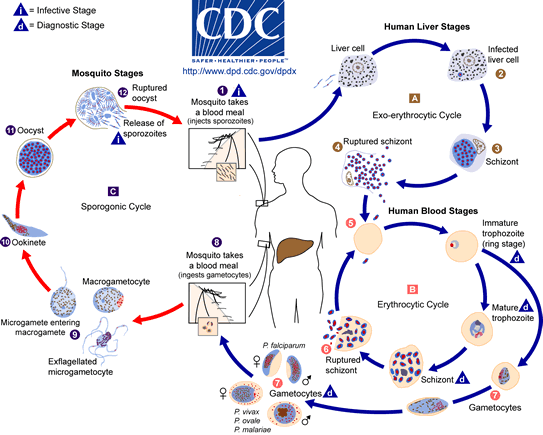 |

The
malaria parasite life cycle involves two hosts. During a blood meal, a
malaria-infected female Anopheles mosquito inoculates sporozoites
into the human host  .
Sporozoites infect liver cells .
Sporozoites infect liver cells  and mature into schizonts
and mature into schizonts  ,
which rupture and release merozoites ,
which rupture and release merozoites  .
(Of note, in P. vivax and P. ovale a dormant stage [hypnozoites]
can persist in the liver and cause relapses by invading the bloodstream
weeks, or even years later.) After this initial replication in the liver
(exo-erythrocytic schizogony .
(Of note, in P. vivax and P. ovale a dormant stage [hypnozoites]
can persist in the liver and cause relapses by invading the bloodstream
weeks, or even years later.) After this initial replication in the liver
(exo-erythrocytic schizogony  ),
the parasites undergo asexual multiplication in the erythrocytes (erythrocytic
schizogony ),
the parasites undergo asexual multiplication in the erythrocytes (erythrocytic
schizogony  ).
Merozoites infect red blood cells ).
Merozoites infect red blood cells  .
The ring stage trophozoites mature into schizonts, which rupture releasing
merozoites .
The ring stage trophozoites mature into schizonts, which rupture releasing
merozoites  .
Some parasites differentiate into sexual erythrocytic stages (gametocytes) .
Some parasites differentiate into sexual erythrocytic stages (gametocytes)
 .
Blood stage parasites are responsible for the clinical manifestations
of the disease. .
Blood stage parasites are responsible for the clinical manifestations
of the disease.
The
gametocytes, male (microgametocytes) and female (macrogametocytes), are
ingested by an Anopheles mosquito during a blood meal  .
The parasites’ multiplication in the mosquito is known as the sporogonic
cycle .
The parasites’ multiplication in the mosquito is known as the sporogonic
cycle  .
While in the mosquito's stomach, the microgametes penetrate the macrogametes
generating zygotes .
While in the mosquito's stomach, the microgametes penetrate the macrogametes
generating zygotes  .
The zygotes in turn become motile and elongated (ookinetes) .
The zygotes in turn become motile and elongated (ookinetes)  which invade the midgut wall of the mosquito where they develop into oocysts
which invade the midgut wall of the mosquito where they develop into oocysts
 .
The oocysts grow, rupture, and release sporozoites .
The oocysts grow, rupture, and release sporozoites  ,
which make their way to the mosquito's salivary glands. Inoculation of
the sporozoites ,
which make their way to the mosquito's salivary glands. Inoculation of
the sporozoites  into a new human host perpetuates the malaria life cycle.
into a new human host perpetuates the malaria life cycle.
Page last modified : February 17, 2006
Content source: Division of Parasitic Diseases
National Center for Zoonotic, Vector-Borne, and Enteric Diseases (ZVED)
|
 |
|